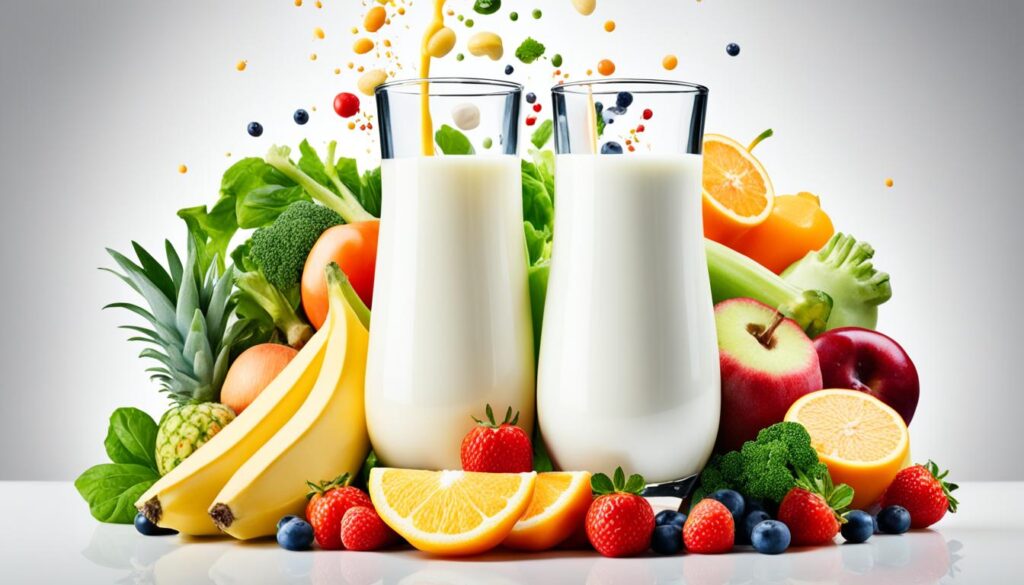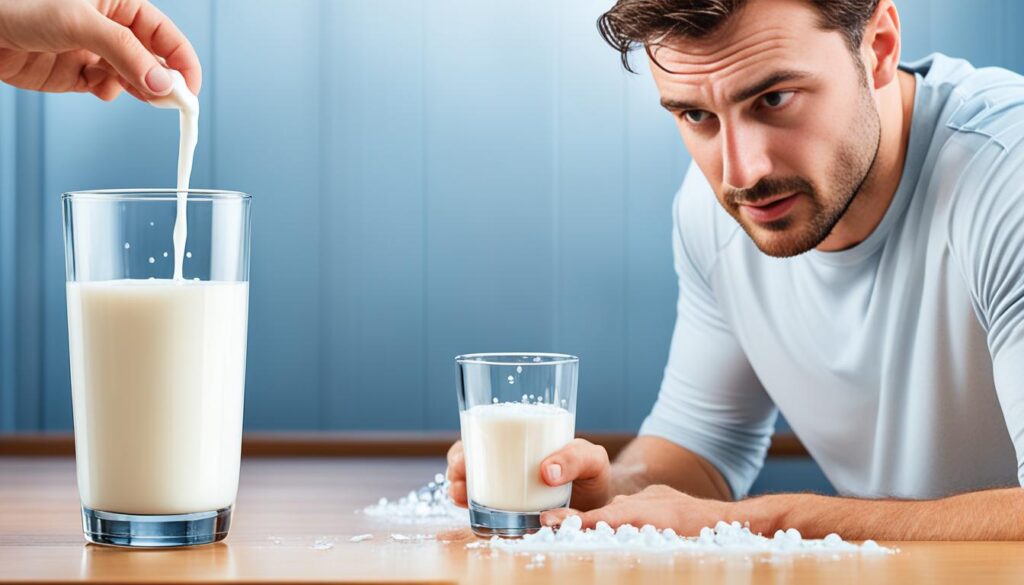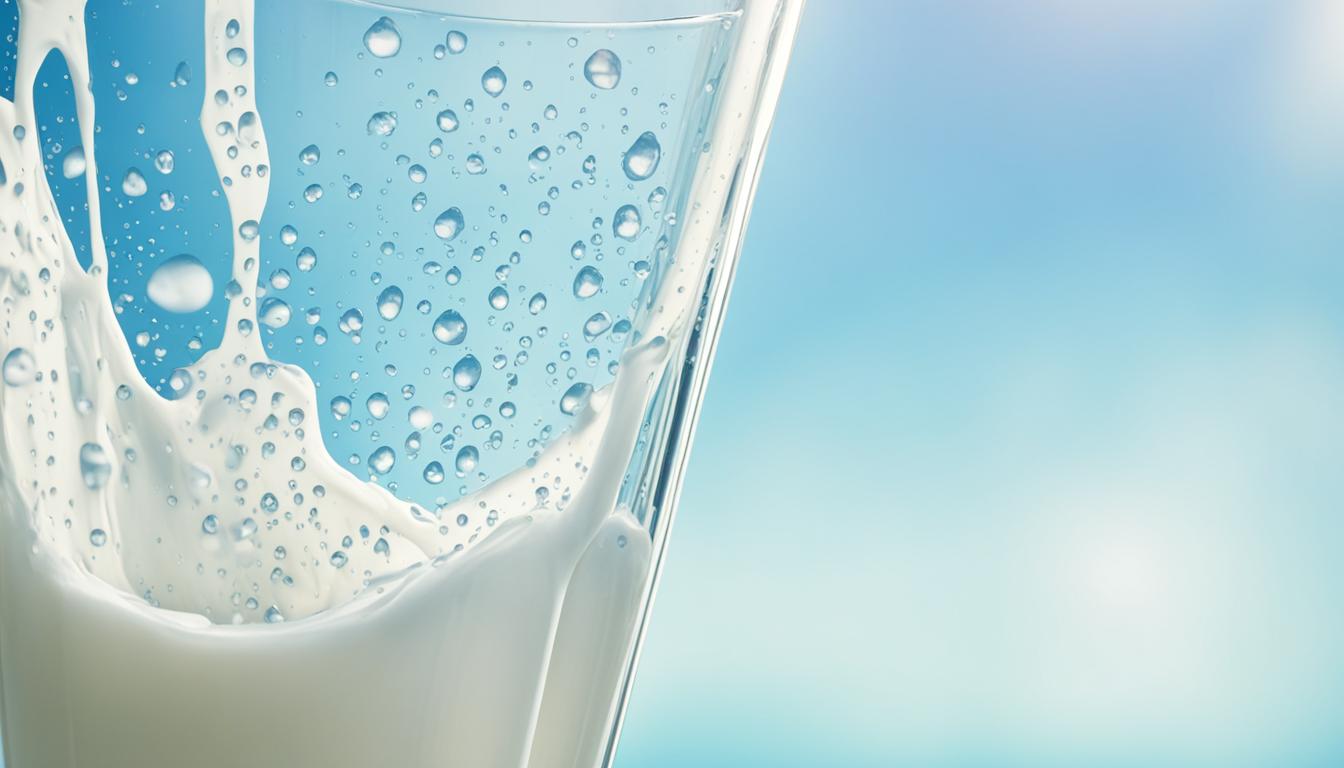“As an Amazon Associate I earn from qualifying purchases.” .
Ever thought if a drink beats water in keeping you hydrated? Many think plain water is the best for staying hydrated. But, new studies show milk might be better in some cases. It has more nutrients than water, making it a strong choice for hydration.
Studies from places like Scotland’s St. Andrews University and a 2016 trial in The American Journal of Clinical Nutrition found something interesting. Milk’s mix of sugars, proteins, fats, and sodium helps you stay hydrated better. For athletes or those losing a lot of sweat, milk could be a better choice than water.
This idea makes us wonder: Is milk the secret to staying hydrated? Let’s look into the science and what makes milk a great choice for hydration. For a detailed look, check out this article on the best drinks for hydration.
Key Takeaways
- Milk’s mix of sugars, proteins, fats, and sodium helps you stay hydrated longer than water.
- Studies show skim and whole milk can be better at hydrating you than plain water.
- Research links lower urine output with drinking milk, showing better fluid retention.
- Cow’s milk has about 90% water and key electrolytes, helping with hydration.
- Nondairy milks like almond and soy milk can hydrate but lack the protein and fat of cow’s milk.
Let’s dive deeper into how milk’s nutrients help with hydration. We’ll see why it’s a top choice for quenching thirst.
The Importance of Hydration
Hydration is key for good health. It helps with many body functions, like keeping joints lubricated and helping with nutrient absorption and detox. Many people still believe wrong things about hydration, even though it’s well-known how important it is.
Why Hydration Matters
About 75% of Americans don’t get enough water. Experts suggest men need 15.5 cups and women 11.5 cups of fluids daily. Drinking enough water keeps your body at the right temperature, helps with digestion, and keeps your skin looking good.
Dairy milk is a great way to stay hydrated. It’s about 87% water and has important electrolytes like sodium, potassium, calcium, and magnesium. These nutrients help keep you hydrated and healthy. Studies show that milk is better than water for staying hydrated because it has more nutrients.
Common Hydration Myths
It’s important to clear up wrong ideas about staying hydrated. Some think coffee and alcohol make you lose water, but it’s not that simple. Coffee can be as good for hydration as water, and beer doesn’t make you lose as much water as hard liquor.
People often think fruit juices help with hydration, but they don’t. The sugar in them can make your body use more water, so they’re not as good for staying hydrated. Understanding these facts is key to staying hydrated the right way.
The Role of Milk in Hydration
Milk is more than just water; it’s packed with nutrients that help keep you hydrated. It has things that water doesn’t, making it a great choice for staying hydrated. Knowing what’s in milk helps us see how it keeps our body’s fluids balanced.

The Nutritional Makeup of Milk
Milk has proteins, fats, and lactose, all working together to keep you hydrated for longer. It’s also full of 13 essential vitamins and minerals that boost your health. This mix helps your body use nutrients better and keeps you feeling good.
An 8-ounce glass of milk gives you about 8 grams of protein. This protein helps fix and grow muscles and keeps you feeling full. But what’s really cool is that milk is mostly water, making up about 90% of it.
Milk Electrolytes and Fluid Retention
Milk has important electrolytes like calcium, potassium, and magnesium. These electrolytes help keep your body’s electrolyte balance and help you hold onto fluids, especially after you’ve been active. Research in The American Journal of Clinical Nutrition shows that milk is better at keeping you hydrated than water. It makes you pee less and helps you hold onto fluids.
The mix of electrolytes in milk helps replace lost sodium and potassium and keeps fluids balanced. Drinking milk can make you hold onto fluids better than drinking just water. So, adding milk to your hydration plan gives you both the hydration and nutrition you need.
| Component | Benefit |
|---|---|
| Proteins | Muscle repair and growth |
| Fats | Prolonged energy release |
| Electrolytes | Fluid balance and retention |
| Vitamins and Minerals | Overall well-being |
| 90% Water | Immediate hydration |
Does Milk Hydrate You?
Milk is more than a drink full of nutrients; it’s also great for staying hydrated. When we look at milk hydration effects versus water, milk often comes out on top. This is because milk has lactose, proteins, and fats that make it take longer to digest. This slow digestion means you stay hydrated for a longer time.
Also, milk has electrolytes like sodium, calcium, and potassium. These electrolytes help your body keep water in, so you don’t have to go to the bathroom as much. So, drinking milk can keep you hydrated for a longer period than just drinking water.
A 2015 study looked at how 13 different drinks hydrate the body. It found that skim and full-fat milk were the best at keeping you hydrated. This is because they have a low urine output. On the other hand, water was less effective because it gets absorbed quickly and you have to go to the bathroom more often.
Studies have shown that drinks like milk are better at helping your body absorb fluids during exercise. This makes milk a great choice for drinking before, during, and after exercise. The American College of Sports Medicine also suggests staying hydrated when you’re active, and milk is a good way to do that.
Let’s summarize some comparative findings on hydration efficiency:
| Beverage | Hydration Efficiency | Urine Output | Electrolyte Content |
|---|---|---|---|
| Skim Milk | High | Low | High |
| Full-Fat Milk | High | Low | High |
| Water | Moderate | High | Low |
| Sports Drinks | Variable | Medium | High |
The table clearly shows that milk vs water hydration is a no-brainer. Milk’s mix of nutrients ensures you stay hydrated longer, making it a better choice for quenching thirst and keeping your body balanced.
Comparing Milk to Water for Hydration
When looking at milk and water for staying hydrated, there are key differences. Fat-free milk stands out for its ability to keep fluids in the body. We’ll see how milk is better at keeping you hydrated, especially after exercise, than water.
Fluid Retention: Milk vs. Water

Milk has sodium and protein, which helps keep fluids in the body. Studies show that fat-free milk is the best at keeping you hydrated. It helps you stay hydrated longer by preventing you from losing fluids too quickly.
Electrolyte Balance: Milk vs. Water
Milk is better than water because it has natural electrolytes. It has sodium, potassium, and a bit of magnesium. These are important for getting back in balance after losing fluids. Water doesn’t have these electrolytes. Many studies say that low-fat or fat-free milk is better at rehydrating you than water or sports drinks.
| Hydration Indicator | Milk | Water |
|---|---|---|
| Fluid Retention | High | Moderate |
| Electrolyte Content | Rich in Sodium, Potassium | None |
| Post-Exercise Rehydration | Highly Effective | Less Effective |
The comparison shows that milk is better than water for staying hydrated and keeping electrolytes balanced. Milk is great for rehydrating after exercise or keeping you hydrated all day.
Milk as a Post-Workout Hydration Option
When looking at drinks after workouts, the post-workout milk benefits are key. Milk is great for replacing fluids, proteins, and other important nutrients after exercise.
Benefits of Milk After Exercise
A study in the Journal of Human Kinetics in 2021 showed how important staying hydrated is for recovery and doing better in workouts. The post-workout milk benefits go beyond just drinking water. Chocolate milk, with its 3-to-1 carb-to-protein ratio, is a top choice for recovery and getting back hydrated. It helps fix muscles, refill glycogen, and rehydrate, making it a full recovery drink.
Also, skim milk has about 90% water, which helps keep you hydrated. This makes it a better choice than many other drinks.
How Milk Compares to Sports Drinks
The debate on milk vs sports drinks is big in sports nutrition. Sports drinks are good for replacing electrolytes, but milk has more nutrients. The American Council on Exercise says to drink 7 to 10 ounces of fluids every 10 to 20 minutes of exercise. Milk not only hydrates but also gives proteins and carbs for recovery.
Here’s a look at how they compare:
| Parameter | Milk | Sports Drinks |
|---|---|---|
| Hydration | High (90% water for skim milk) | High |
| Protein Content | 8g per 1 cup | Low |
| Electrolytes | Includes calcium, potassium, sodium | Varies, often focuses on sodium and potassium |
| Carbohydrates | 13g per 1 cup | High |
| Cost | Generally cost-effective | Varies, usually more expensive |
Looking at milk and sports drinks, milk has a lot more nutrients. Unlike sports drinks, which mainly replace fluids and electrolytes, milk gives many nutrients for recovery and better performance.
In the end, adding milk to your post-exercise drink plan is good for both new and pro athletes. It’s a budget-friendly and nutrient-rich choice compared to sports drinks.
Scientific Studies on Milk Hydration
Reputable institutions have deeply studied milk as a way to stay hydrated. Their findings show how milk stacks up against water and sports drinks. This research is key for understanding milk’s role in keeping us hydrated.
Key Findings from Loughborough University Study
The Loughborough University study on hydration looked at how milk compares to water and sports drinks. They found that both full-fat and skimmed milk are better at keeping us hydrated. This is because milk has lactose, proteins, and electrolytes that help our bodies hold onto fluids longer.
Results from McMaster University Research
Another study by McMaster University backed up these results. The McMaster University milk study showed that milk’s mix of sodium and calcium makes it a better choice for staying hydrated. People who drank milk after exercise or during the day stayed hydrated for longer.
| Study | Beverages Compared | Key Findings |
|---|---|---|
| Loughborough University | Milk, Water, Sports Drinks | Milk retained fluids longer than water and sports drinks |
| McMaster University | Milk, Water | Milk’s sodium and calcium enhance fluid retention |
Dairy Beverages and Their Hydration Potential
Different dairy drinks have various levels of hydration potential. This depends on their fat content, nutrient mix, and what people like. Knowing this helps pick the best dairy drink for staying hydrated.
Full-Fat vs. Skimmed Milk
The argument between full-fat milk vs skimmed milk is about how well they hydrate. Both full-fat and skimmed milk are good at keeping fluids in the body, just like water. Full-fat milk stays in the stomach longer because of its fat, which might help keep fluids in better. On the other hand, skimmed milk empties the stomach faster. Yet, both types of milk hydrate the body equally well.
Comparison With Other Dairy Beverages
Looking at dairy drinks hydration, we see a variety of options. A study in The American Journal of Clinical Nutrition found milk hydrates better than water. Non-dairy drinks like almond milk and coconut milk also help with hydration. For example, almond milk, with fewer carbs, hydrates like whole milk does. Adding ice to these drinks makes them even more refreshing for those looking for something new.
Looking at the dairy hydration potential, we see the type and what’s in the drink matter a lot. Choosing the right drink means thinking about how it tastes and fits your diet goals.
Non-dairy milk hydration levels vary by type and solids content. For example, almond milk can be as hydrating as whole milk.
Milk’s Hydration Benefits Explained
Milk is great for staying hydrated, offering more than just water. It has sodium, protein, and fat that help keep fluids in your body. These elements make milk a powerful drink for staying hydrated.
The Role of Sodium in Hydration
Sodium in milk is key for staying hydrated. It helps keep the right balance of electrolytes in your body. This balance is crucial for staying hydrated over time. It prevents dehydration and keeps your body working well.
Impact of Protein and Fat on Fluid Retention
Protein and fat in milk also play a big part in keeping fluids in your body. They slow down digestion, which means your body can hold onto fluids for longer. This is different from water, which hydrates quickly but doesn’t last as long.
| Beverage | Water Content (%) | Calories per Cup | Protein per Cup (g) | Fat per Cup (g) |
|---|---|---|---|---|
| Skim Milk | 90 | 83 | 8 | 0.2 |
| Whole Milk | 88.1 | 149 | 8 | 8 |
| Soy Milk | 92 | 80 | 7 | 4 |
| Oat Milk | 90.6 | 130 | 3 | 2.5 |
So, sodium, protein, and fat in milk make it better for hydration than water. These elements show why milk is a good choice for keeping your body hydrated. It’s a great drink for maintaining fluid balance.
Practical Tips for Using Milk as a Hydration Source
Adding milk to your hydration plan is a smart move, especially if you need to keep fluids in your body. A study in 2016 found that both skim and whole milk are better at hydrating than water. This is because they have electrolytes like sodium and potassium, which help your body hold onto fluids.
When to Opt for Milk
Think about drinking milk when you’re active or after you’ve worked out. It’s packed with carbs and proteins that help your muscles recover and keep fluids in your body. Milk keeps you hydrated for up to four hours, thanks to its almost 90% water content. It’s great for meeting your daily fluid needs, especially if you need extra nutrients and hydration.
Potential Downsides of Milk for Hydration
Even though milk is a good choice for staying hydrated, it’s not perfect for everyone. Some people can’t digest lactose well, which might cause stomach problems. Also, milk has calories, so it’s not the best choice if you’re watching your calorie intake. In cases where you need quick hydration, water or electrolyte drinks might be better. It’s important to weigh the pros and cons of milk to choose the best hydration option for you.
FAQ
What are the hydration benefits of milk?
How does milk help in quenching thirst?
Why is hydration important for overall health?
What are common hydration myths?
What is the nutritional makeup of milk?
How do milk electrolytes contribute to hydration?
Does milk hydrate better than water?
How does milk compare to water in terms of fluid retention?
What are the benefits of milk after exercise?
How does milk compare to sports drinks?
What did the Loughborough University study find about milk hydration?
What are the results from McMaster University’s research on milk?
How do full-fat and skimmed milk differ in hydration potential?
How do dairy beverages compare in terms of hydration?
How does sodium in milk enhance hydration?
What impact do proteins and fats in milk have on fluid retention?
When should you opt for milk as a hydration source?
What are the potential downsides of using milk for hydration?
“As an Amazon Associate I earn from qualifying purchases.” .



